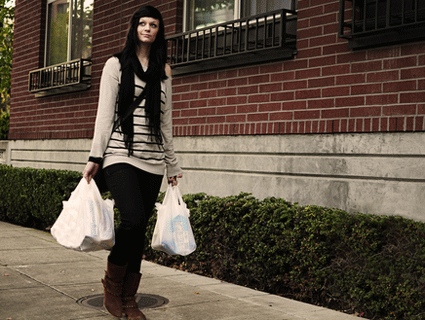
<a href="http://www.shutterstock.com/cat.mhtml?lang=en&search_source=search_form&version=llv1&anyorall=all&safesearch=1&searchterm=plastic+bag&search_group=#id=64397395&src=9a219f2c36c0d72fa470db818185f679-3-91">Darengphoto</a>/Shutterstock
Attention Los Angelinos: It’s time to start hoarding those plastic shopping bags you love so much. The Los Angeles City Council voted on Wednesday to phase out plastic bags over the next 16 months. The city will eventually implement a 10-cent charge for paper bags, too.
LA is the largest city to approve a ban on “single-use” plastic bags in supermarkets. The ban is a victory for environmentalists, who campaigned for it for years. The decision did not pass without complaint, however—employees of plastic bag companies and some consumers have voiced concerns over the change.
LA’s not the only city that has passed a plastic bag ban. Here are some other places that have similar ordinances:
- San Francisco was the first US city to adopt a plastic shopping bag ban in April 2007. The ordinance originally applied only to supermarket and pharmacy chains but was expanded to all retail establishments earlier this year.
- Maui, Hawaii banned plastic bags in August, 2008, becoming the first county in Hawaii to do so. Since then, Kauai and Honolulu have also passed legislation to ban plastic bags.
- Washington, D.C. has charged 5 cents for all disposable shopping bags since 2010. The tax has reduced plastic bag use.
- In December, Seattle unanimously passed an ordinance banning single-use plastic bags and forcing stores to begin charging for paper bags. The new rules will go into effect later this year.
- In March, Austin adopted a ban on all single-use shopping bags for all business establishments. The ban begins in 2013.
- Portland passed a plastic bag ban in July 2011 after the state legislature failed to pass a state-wide ban.
At this rate, it’s only a matter of time before folks with fashionable eco-friendly tote bags no longer stand out in a crowd.
Also, it seems that the British are behind the trend, too:









